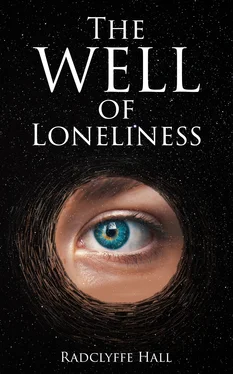‘So that’s it, you want to be a writer. Well, why not? You’ve got plenty of talent, Stephen; I should be a proud man if you were a writer.’ After which their discussions on the making of books held an even more vital enchantment.
But Anna came less and less often to the study, and she would be sitting alone and idle. Puddle, upstairs at work in the schoolroom, might be swatting at her Greek to keep pace with Stephen, but Anna would be sitting with her hands in her lap in the vast drawing-room so beautifully proportioned, so restfully furnished in old polished walnut, so redolent of beeswax and orris root and violets—all alone in its vastness would Anna be sitting, with her white hands folded and idle.
A lovely and most comfortable woman she had been, and still was, in spite of her gentle ageing, but not learned, oh, no, very far from learned—that, indeed, was why Sir Philip had loved her, that was why he had found her so infinitely restful, that was why he still loved her after very many years; her simplicity was stronger to hold him than learning. But now Anna went less and less often to the study.
It was not that they failed to make her feel welcome, but rather that they could not conceal their deep interest in subjects of which she knew little or nothing. What did she know of or care for the Classics? What interest had she in the works of Erasmus? Her theology needed no erudite discussion, her philosophy consisted of a home swept and garnished, and as for the poets, she liked simple verses; for the rest her poetry lay in her husband. All this she well knew and had no wish to alter, yet lately there had come upon Anna an aching, a tormenting aching that she dared give no name to. It nagged at her heart when she went to that study and saw Sir Philip together with their daughter, and knew that her presence contributed nothing to his happiness when he sat reading to Stephen.
Staring at the girl she would see the strange resemblance, the invidious likeness of the child to the father, she would notice their movements so grotesquely alike; their hands were alike, they made the same gestures, and her mind would recoil with that nameless resentment, the while she reproached herself, penitent and trembling. Yet penitent and trembling though Anna might be, she would sometimes hear herself speaking to Stephen in a way that would make her feel secretly ashamed. She would hear herself covertly, cleverly gibing, with such skill that the girl would look up at her bewildered; with such skill that even Sir Philip himself could not well take exception to what she was saying; then, as like as not, she would laugh if off lightly, as though all the time she had only been jesting, and Stephen would laugh too, a big, friendly laugh. But Sir Philip would not laugh, and his eyes would seek Anna’s, questioning, amazed, incredulous and angry. That was why she now went so seldom to the study when Sir Philip and his daughter were together.
But sometimes, when she was alone with her husband, Anna would suddenly cling to him in silence. She would hide her face against his hard shoulder clinging closer and closer, as though she were frightened, as though she were afraid for this great love of theirs. He would stand very still, forbearing to move, forbearing to question, for why should he question? He knew already, and she knew that he knew. Yet neither of them spoke it, this most unhappy thing, and their silence spread round them like a poisonous miasma. The spectre that was Stephen would seem to be watching, and Sir Philip would gently release himself from Anna, while she, looking up, would see his tired eyes, not angry any more, only very unhappy. She would think that those eyes were pleading, beseeching; she would think: ‘He’s pleading with me for Stephen.’ Then her own eyes would fill with tears of contrition, and that night she would kneel long in prayer to her Maker:
‘Give me peace,’ she would entreat, ‘and enlighten my spirit, so that I may learn how to love my own child.’
Sir Philip looked older now than his age, and seeing this, Anna could scarcely endure it. Everything in her cried out in rebellion so that she wanted to thrust back the years, to hold them at bay with her own weak body. Had the years been an army of naked swords she would gladly have held them at bay with her body. He would constantly now remain in his study right into the early hours of the morning. This habit of his had been growing on him lately, and Anna, waking to find herself alone, and feeling uneasy would steal down to listen. Backwards and forwards, backwards and forwards! She would hear his desolate sounding footsteps. Why was he pacing backwards and forwards, and why was she always afraid to ask him? Why was the hand she stretched out to the door always fearful when it came to turning the handle? Oh, but it was strong, this thing that stood between them, strong with the strength of their united bodies. It had drawn its own life from their youth, their passion, from the splendid and purposeful meaning of their passion—that was how it had leapt full of power into life, and now it had thrust in between them. They were ageing, they had little left but their loving—that gentler loving, perhaps the more perfect—and their faith in each other, which was part of that loving, and their peace, which was part of the peace of Morton. Backwards and forwards, backwards and forwards! Those incessant and desolate sounding footsteps. Peace? There was surely no peace in that study, but rather some affliction, menacing, prophetic! Yet prophetic of what? She dared not ask him, she dared not so much as turn the door-handle, a haunting premonition of disaster would make her creep away with her question unasked.
Then something would draw her, not back to her bedroom, but on up the stairs to the room of their daughter. She would open that door very gently—by inches. She would hold her hand so that it shaded the candle, and would stand looking down at the sleeping Stephen as she and her husband had done long ago. But now there would be no little child to look down on, no small helplessness to arouse mother-pity. Stephen would be lying very straight, very large, very long, underneath the neatly drawn covers. Quite often an arm would be outside the bedspread, the sleeve having fallen away as it lay there, and that arm would look firm and strong and possessive, and so would the face by the light of the candle. She slept deeply. Her breathing would be even and placid. Her body would be drinking in its fill of refreshment. It would rise up clean and refreshed in the morning; it would eat, speak, move—it would move about Morton. In the stables, in the gardens, in the neighbouring paddocks, in the study—it would move about Morton. Intolerable dispensation of nature, Anna would stare at that splendid young body, and would feel, as she did so, that she looked on a stranger. She would scourge her heart and her anxious spirit with memories drawn from this stranger’s beginnings: ‘Little—you were so very little!’ she would whisper, ‘and you sucked from my breast because you were hungry—little and always so terribly hungry—a good baby though, a contented little baby—’
And Stephen would sometimes stir in her sleep as though she were vaguely conscious of Anna. It would pass and she would lie quiet again, breathing in those deep, placid draughts of refreshment. Then Anna, still ruthlessly scourging her heart and her anxious spirit, would stoop and kiss Stephen, but lightly and very quickly on the forehead, so that the girl should not be awakened. So that the girl should not wake and kiss back, she would kiss her lightly and quickly on the forehead.
The eye of youth is very observant. Youth has its moments and keen intuition, even normal youth—but the intuition of those who stand midway between the sexes, is so ruthless, so poignant, so accurate, so deadly, as to be in the nature of an added scourge; and by such an intuition did Stephen discover that all was not well with her parents.
Читать дальше











